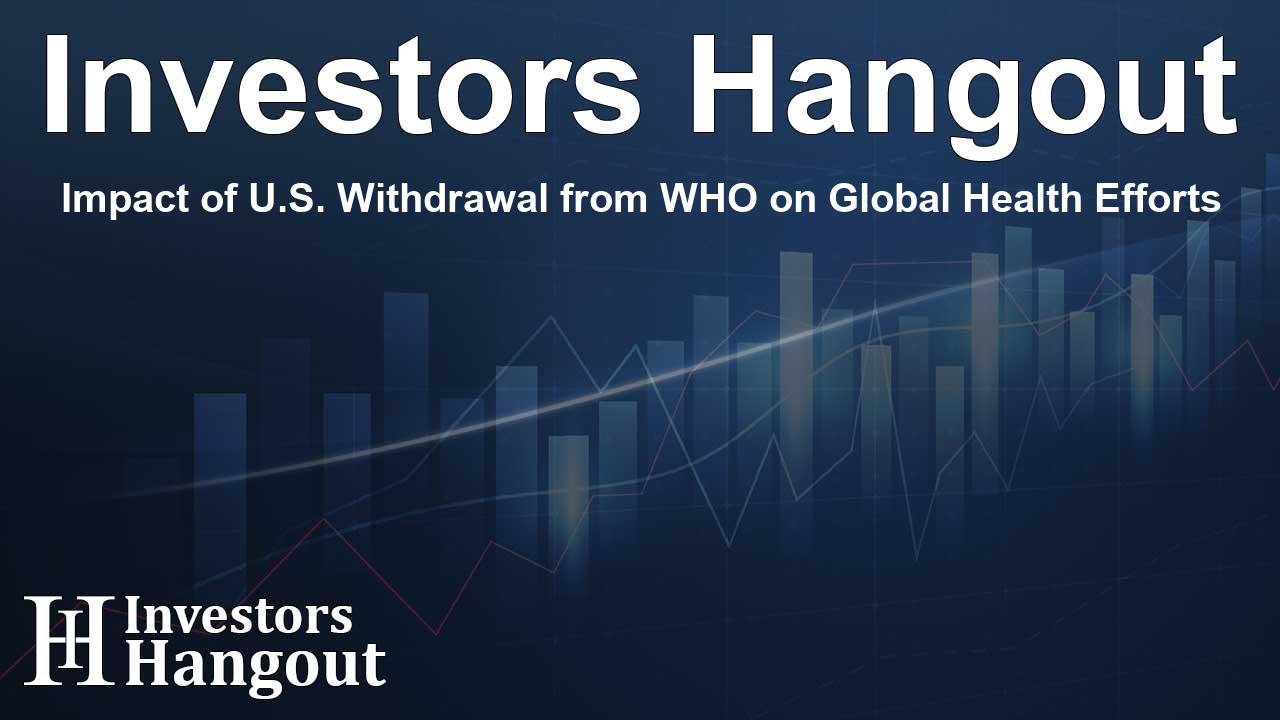Impact of U.S. Withdrawal from WHO on Global Health Efforts

Effect on Global Health Initiatives
The withdrawal of the U.S. from the World Health Organization (WHO) raises significant concerns regarding global health initiatives. This decision could undermine the WHO's ability to effectively fight diseases and respond to emergencies without support from its largest financial contributor.
Who are the Major Contributors?
The U.S. has historically been a cornerstone in global health funding, contributing approximately 18% of the WHO's budget, which is crucial for health programs worldwide. This financial commitment amounts to billions, impacting disease control in regions facing urgent health threats.
Significance of U.S. Funding
In 2024-2025, the WHO has projected its budget at around $6.8 billion, with a significant portion traditionally funded by the U.S. This financial support includes vital programs targeting diseases such as HIV/AIDS, tuberculosis, and other critical health concerns, making the U.S. the largest global health donor, contributing about $15.8 billion in 2022 alone.
Negotiations for a Pandemic Treaty
Moreover, the U.S. withdrawal signals skepticism towards ongoing negotiations aimed at fostering global collaboration for pandemic responses. Insights from notable figures like Elon Musk emphasize resistance towards ceding authority to international bodies like the WHO, complicating future global health governance.
Impact on WHO Collaborations
With the potential withdrawal, U.S. personnel involved with the WHO are expected to be recalled, disrupting collaborative efforts, particularly those between the Centers for Disease Control and Prevention (CDC) and global health initiatives. The CDC has long worked with the WHO on vital health research and responses to outbreaks.
Global Disease Surveillance Participation
The U.S.'s role in global influenza surveillance and advising on seasonal flu vaccines would also be at risk. The WHO’s ability to monitor and guide responses to flu outbreaks could be weakened, affecting not only the U.S. but also many nations relying on WHO recommendations.
Funding AIDS and Other Health Programs
The continuous U.S. support for international health efforts, particularly in combating HIV through PEPFAR, plays a major role in global health. With funding being renewed on a year-by-year basis, any cutback could adversely impact initiatives tackling AIDS, further emphasizing the need for sustained U.S. health funding.
Women’s Reproductive Health Concerns
The reinstatement of policies restricting reproductive health funding under Trump's administration, such as the Mexico City Policy, has already strained funding to international organizations. The decision intensifies challenges faced by groups advocating for reproductive rights, constraining resources available for women's health services globally.
Vaccine Contributions Consistency
Despite skepticism, funding for global vaccine initiatives, such as Gavi and the Global Fund to Fight AIDS, Tuberculosis and Malaria, remained stable throughout Trump's presidency. The future efforts towards vaccine distribution across various regions could be influenced by this withdrawal and changing political landscapes.
Research Efforts and Health Standards
Health emergencies around the world will continue to require U.S. involvement, particularly through institutions like the National Institutes of Health, which is integral for research and management of global health issues, including responses to outbreaks like Ebola and mpox. The contribution of U.S. health agencies to setting standards and guiding medical safety practices remains crucial for worldwide health initiatives.
Conclusion
The overarching impact of the U.S. withdrawal from the WHO on global health remains uncertain. As new health emergencies arise, the trajectory of U.S. involvement in global health will likely adapt according to emerging priorities. Engaging in active global health discussions while assessing the challenges introduced by such significant withdrawals is critical for international health cooperation.
Frequently Asked Questions
What was the U.S. contribution to the WHO before the withdrawal?
The U.S. contributed approximately 18% of the WHO's budget, significantly affecting global health funding.
How does the withdrawal affect HIV/AIDS funding?
The U.S. provides substantial support through PEPFAR, which could be compromised if funding decreases.
What is the impact on global health monitoring?
The U.S. plays a vital role in global disease surveillance, including influenza, which could be hindered by the withdrawal.
Will U.S. personnel continue to work with the WHO?
Following the withdrawal, U.S. staff and contractors working with the WHO are expected to be reassigned, disrupting collaboration.
How might future health emergencies be managed?
Without U.S. involvement, the ability to respond effectively to future health crises may be weakened, affecting global health readiness and response capabilities.
About The Author
Contact Thomas Cooper privately here. Or send an email with ATTN: Thomas Cooper as the subject to contact@investorshangout.com.
About Investors Hangout
Investors Hangout is a leading online stock forum for financial discussion and learning, offering a wide range of free tools and resources. It draws in traders of all levels, who exchange market knowledge, investigate trading tactics, and keep an eye on industry developments in real time. Featuring financial articles, stock message boards, quotes, charts, company profiles, and live news updates. Through cooperative learning and a wealth of informational resources, it helps users from novices creating their first portfolios to experts honing their techniques. Join Investors Hangout today: https://investorshangout.com/
The content of this article is based on factual, publicly available information and does not represent legal, financial, or investment advice. Investors Hangout does not offer financial advice, and the author is not a licensed financial advisor. Consult a qualified advisor before making any financial or investment decisions based on this article. This article should not be considered advice to purchase, sell, or hold any securities or other investments. If any of the material provided here is inaccurate, please contact us for corrections.
